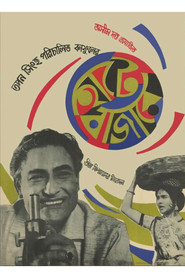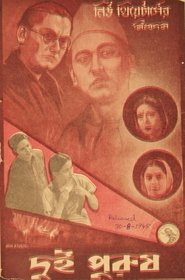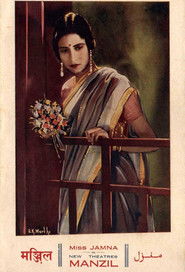Subodh Mitra
Director
-
Birthday
-
Zodiac Sign
-
Genres
0
Total Films
Also known as (female)
Place of Birth
-
Birthday
-
Zodiac Sign
-
Genres
0
Total Films
-
Also Known As (female)
-
Place of Birth
-
Birthday
-
Zodiac Sign
-
Genres
0
Total Films
Also known as (female)
Place of Birth
-
Birthday
-
Zodiac Sign
-
Genres
0
Total Films
-
Also Known As (female)
-
Place of Birth
actor
0 Works
producer
0 Works
director
14 Works
writer
1 Works
other
8 Works
Kie Kahara
Prakash, who can't depart his family values in the mean time he don't want to suppress his modern dreams with new thoughts. The conflict begins.Year:
1968

Grihadaha
Based on the novel "Grihadaha" written by Sarat Chandra Chattopadhyay.Year:
1967

Grihadaha
Based on the novel "Grihadaha" written by Sarat Chandra Chattopadhyay.Year:
1967

The Market Place
The story of Dr. Mukherjee, a highly respected civil surgeon in a small tribal district headquarters. He is the beloved of the local people, and often comes in conflict with Laxman Lal, the tyrannical son of a local aristocrat. Laxman Lal lusts after a local widow who, in order to escape his advances seeks shelter with Dr. Mukherjee. As Dr. Mukherjee treats the poor he becomes even more entwined with their lives and their little problems. To the tribals he is a godlike figure, but to Laxman Lal he is an enemy.Year:
1967

Raikamal
Raikamal narrates the story of Rai Kamal, a devotee of Lord Krishna. Rai Kamal and Ranjan are childhood sweethearts. When Ranjan grows up he wishes his desire to marry Rai but his parents are against this match as they are Brahmins and Rai Kamal was a low caste Vaishnav.Year:
1955

Raikamal
Raikamal narrates the story of Rai Kamal, a devotee of Lord Krishna. Rai Kamal and Ranjan are childhood sweethearts. When Ranjan grows up he wishes his desire to marry Rai but his parents are against this match as they are Brahmins and Rai Kamal was a low caste Vaishnav.Year:
1955

Nabin Jatra
A 1953 Bengali Drama Film directed by Subodh Mitra.Year:
1953

Nabin Jatra
A 1953 Bengali Drama Film directed by Subodh Mitra.Year:
1953

Two Generations
One of the early films of Chhabi Biswas featuring him as a leading man, before he came to be associated with the dominating patriarch roles that have become iconic in Bengali cinema, the film is a tale of the love, relationships and ideals of two generations. Nutubihari is an idealist who has given up his love for Kalyani for the sake of his beliefs. He marries Bimala and becomes a lawyer, fighting for the rights of the poor against the feudal lords. Meanwhile, Kalyani comes to ask refuge after she becomes a widow and is inexplicably accepted by Bimala with a lot of warmth. As the years pass Kalyani's daughter Mamata and Nutu's oldest son Arun fall in love and wish to get married. However, the new-found fame and fortune turns his head and Nutu begins to resemble all the ideals and vices that he had always despised. On the other hand in an ironical turn of events, Arun comes to occupy the position once held by his father, highlighting the generational conflict of ideals.Year:
1945

Two Generations
One of the early films of Chhabi Biswas featuring him as a leading man, before he came to be associated with the dominating patriarch roles that have become iconic in Bengali cinema, the film is a tale of the love, relationships and ideals of two generations. Nutubihari is an idealist who has given up his love for Kalyani for the sake of his beliefs. He marries Bimala and becomes a lawyer, fighting for the rights of the poor against the feudal lords. Meanwhile, Kalyani comes to ask refuge after she becomes a widow and is inexplicably accepted by Bimala with a lot of warmth. As the years pass Kalyani's daughter Mamata and Nutu's oldest son Arun fall in love and wish to get married. However, the new-found fame and fortune turns his head and Nutu begins to resemble all the ideals and vices that he had always despised. On the other hand in an ironical turn of events, Arun comes to occupy the position once held by his father, highlighting the generational conflict of ideals.Year:
1945
Doctor
An early example of social realism that reached its height with 'Udayer Pathey' and more memorably with 'Chhinnamul', 'Doctor' was meant as a stringent critique of practices that were beginning to be deemed as persistant evils that plague society, namely superstitions, religious dogma and discrimination on the basis of caste. However, that would be a far too simplistic reading of the multiple thematic elements that tie together the narrative of 'Doctor'. The idea of caste based discrimination, violence and upper-caste hypocrisy is placed alongside the notions of generational conflict in a father-son relationship and the idea of a ever-widening generation gap especially in the historical and socio-political context of the film.Year:
1940

Baradidi
Suren, prevented by his family from pursuing a university career, leaves home and becomes a tutor to Pramila. He falls in love with her widowed elder sister Madhavi who, although returning his love, has him sacked to save the situation.Year:
1939

Abhigyan
A wife rejected by her in-laws following her abduction is given shelter by the husband's friend. The storyline follows the wife's ambivalent feelings for her savior when she's accepted back into the family.Year:
1938

Grihadaha
The poor but educated Mahim and his childhood friend, the rich but conservative Suresh, both fall in love with the same woman, the liberated Achala. Mahim marries her and they move to a village but she cannot forget Suresh. Her smoldering unhappiness takes the form of resentment towards the orphaned Mrinal, raised by Mahim's father, and receives a dramatic visual embodiment when their house burns down. Mahim falls ill, is rescued by Suresh, and nursed back to health by Achala. On a train (a metaphor for the irreversibly linear course of life) to a health resort where Mahim is supposed to convalesce, Suresh on a rainswept night gives in to temptation and elopes with Achala. At the end of the film, there is a dubious reconciliation as Achala is shown following Mahim's 'good' traditionalism with Sharatchandra's barely concealed hostility towards Achala's liberated Brahmo Samaj upbringing.Year:
1936